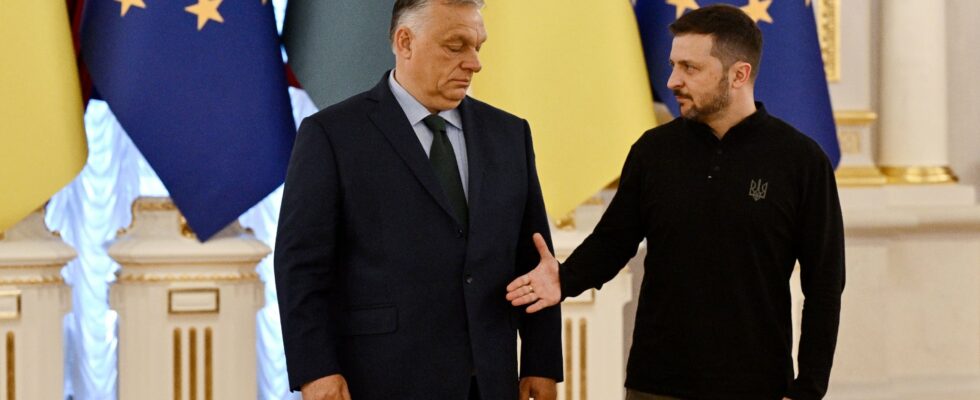Following the sixth package of sanctions against Russia, voted in December 2022 due to the war in Ukraine, all members of the European Union (EU) have resolved to apply an oil embargo against Moscow. All member countries? No… Three countries – Slovakia, the Czech Republic, Hungary – were exempted, due to their geographical location. Landlocked, it is difficult for them to diversify their energy supply, unlike other countries with access to the sea. The measure, which expired last December, was extended for one year on the occasion of the 12th package of sanctions targeting Vladimir Putin.
However, in June, Ukraine undertook a series of sanctions against the Russian oil company Lukoil, blocking its deliveries for several weeks, which represent “a third of Hungarian oil imports”, according to the head of diplomacy Peter Szijjarto. Kiev has the technical means to do so since Hungarian orders transit through its territory, via the Druzhba pipeline. The Ukrainian intervention is irritating in the Puszta plain, where it is considered that the situation is not sustainable in the “medium and long term”. Budapest, supported by its Slovak ally, called on the European Union on Monday 22 July to settle the dispute between it and the attacked country. It asked it to take part in “a consultation procedure”. For the President of the Slovak government Robert Fico and the Hungarian Prime Minister Viktor Orban, the Ukrainian initiative constitutes a “violation of the EU-Ukraine association agreement”. “In the absence of an agreement, there could be recourse to an arbitration tribunal,” reports AFP.
“Orban must guarantee access to cheap energy because he is facing a major crisis in purchasing power,” explains Matthieu Boisdron, doctor of history at Sorbonne University, lecturer at Nantes University and deputy editor-in-chief of Central European Mail. The Hungarian country experienced a recession in 2023, with a contraction of -0.5% of its GDP. A landlocked country, Hungary has a “very strong dependence” on Russian fossil fuels, explains Matthieu Boisdron. In addition to its geographical location, the explanation for Hungary’s dependence lies in the balance of its energy mix. In 2020, 68% of Hungary’s energy supply came from fossil fuels, according to the International Energy AgencyBy granting an exemption on the oil issue, the EU has managed to get Hungary to accept the sixth package of sanctions targeting Russia.
Orban goes against the grain
Even though Viktor Orban flirts with Putin’s dictatorship, the deterioration of relations between Hungary and Ukraine goes back further. “There are tensions around the Hungarian minority in Transcarpathia”, a region in southwestern Ukraine, says Matthieu Boisdron, reporting a “mutual game of mistrust between Orban and Zelensky”. The presence of this minority on Ukrainian soil, just like those living in Serbia or Romania, allows the Hungarian leader to “install his national narrative” and present Hungary as a power constrained by Europe, amputated in the last century of part of its territory and its power.
Since coming to power in 2010, Viktor Orban has broken with the international policy of “mediator between East and West”, adopted for nearly forty years by Hungary. The leader of the Fidesz party wanted to “find other interlocutors and began to dialogue with Turkey and Russia”, notes academic Matthieu Boisdron. At the head of the rotating presidency of the Council of the EU since July, the Hungarian Prime Minister has already shocked people by going, on July 5, to shake hands with Vladimir Putin in the Kremlin.
The Hungarian diplomatic adventure continues to marginalize Viktor Orban within the European Union. In response to this affront, Josep Borell – head of European diplomacy – announced that he would move the meeting of foreign ministers of the member countries, initially scheduled for the end of August in Budapest, to Brussels. In addition, the Spaniard assured that no commissioner would travel to Hungary for future meetings, leaving senior officials the task of representing the institution. This boycott will be effective until the end of the year.
In Europe, Orban can only count on Robert Fico. He is his last ally since the Polish PiS government was defeated in the autumn 2023 legislative elections. “Without Fico, the EU could have relaunched the Article 7 procedure” with regard to Hungary, specifies Matthieu Boisredon. Initiated in 2017 Following “a serious deterioration in the rule of law, democracy and fundamental rights in recent years”, the procedure – which sanctions the violation of European values - would allow the 26 to bring the 27th into line.
